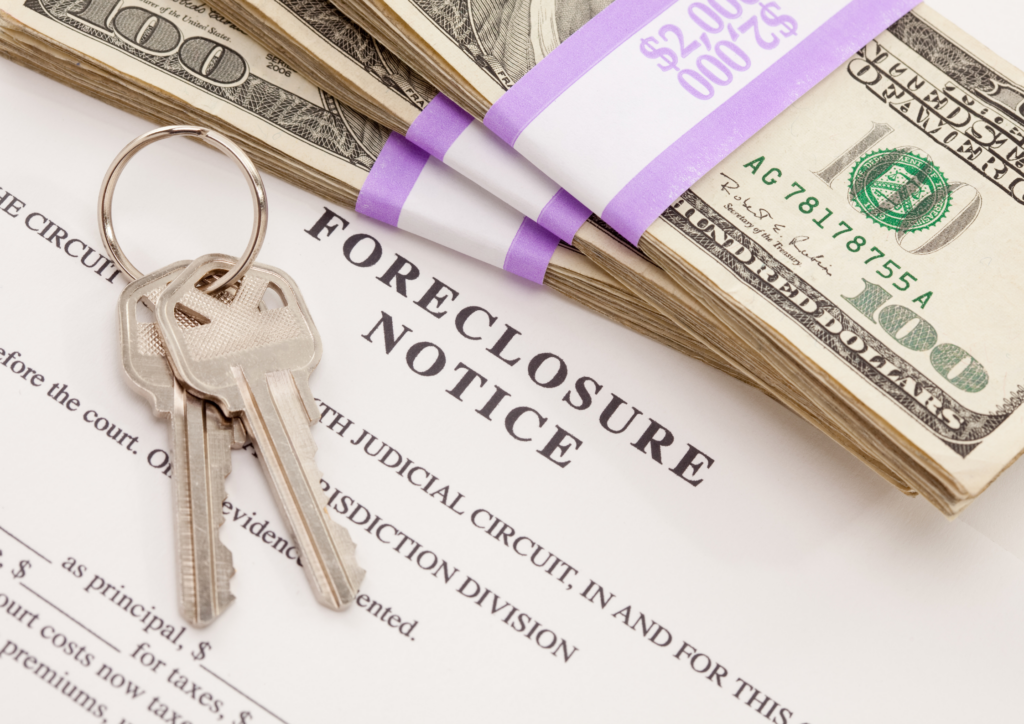When a borrower of a loan fails to comply with the mortgage payments, the lender will most likely foreclose the property. Usually, it results in an auction and the property is sold to a new owner.
If the foreclosure sale resulted in excess funds, the lender is only entitled to the amount that is needed to pay off the debt and the fees that were associated with the foreclosure and sales. The previous owner will be entitled to any proceeds that are left.
Read on to learn the details about what will happen to the surplus or excess funds and how to retrieve them.
What Are Surplus Funds From Foreclosure?

Surplus funds, also known as excess funds or overage funds, are the funds that remain after a foreclosure auction, and the mortgage has been fully paid off. The proceeds must be disbursed without extra costs by the trustee designated at the foreclosure auction.
To put it another way, when the foreclosure is completed, the property is sold to fulfill the mortgagee’s judgment; if the price paid exceeds the amount owing to the mortgagee, the leftover monies are referred to as “surplus.”
It depends on the circumstances and the law of the state which has jurisdiction over the property whether the foreclosure is judicial or nonjudicial.
The foreclosure auction will be conducted by a court officer, generally a sheriff, in a judicial foreclosure. A trustee will be appointed to handle the sale in a nonjudicial foreclosure. In any scenario, the property is usually auctioned off to the highest bidder during a foreclosure auction.
How Do Foreclosure Sales Work?
The high bidder at a foreclosure auction might be the foreclosing lender or a third party. If no one else makes a greater offer than the lender, the property is acquired by the lender and becomes the Real Estate Owned (REO).
If a third party places the highest offer, that person or entity must then pay for the estate with a money order, cashier’s check, or cash to become the new owner.
Previously, foreclosure sales happened on courthouses steps, or a public area with an auctioneer present, or online.
However, if the sale of the property generates less than what is owed, the sale will result in a deficiency. Depending on the law of the state, the lender might get a deficiency judgment against the foreclosed borrower.
What Will Happen After A Foreclosure?

After a foreclosure, the extra funds that you can obtain from the sale of the property might help to lessen your burden by paying your rent or enabling you to put down a deposit on your new property.
The amount you can obtain from mortgage surplus money is determined by the amount owing to the lender and the house’s selling price.
Surplus funds are calculated by deducting outstanding mortgage amounts from the bidder’s purchase price and include any and all fees and penalties incurred by the property. To put it another way, surplus funds are the difference between the selling price and the amount due.
Once the money is in the hands of the officer of the court or the trustee, it is their obligation to distribute them correctly. Funds must be allocated in a very precise way throughout the mortgage foreclosure procedure, as follows:
- The mortgagor is first compensated for any outstanding debts, as well as the expense of foreclosure. Because they are the principal lienholder and typically the one foreclosing on the house, they are granted first priority for the cash.
- Any subordinate lien holders are paid next if there are any funds left over after the obligations to the mortgage lender have been settled. A subordinate lienholder in a mortgage foreclosure case might be the lender from a second mortgage or a home equity line of credit. If the previous homeowner had a judgment against them, they would also be compensated at this point in the process.
- Finally, if there are any funds left over after the subordinate lien holders have been paid in a mortgage foreclosure, the former homeowner (or the foreclosed party) is entitled to the money.
If you are residing in the State of California, any unspent cash must be distributed to the most recent owner of the repossessed property, according to the law. If another party has a claim on the property, such as a second mortgage, the excess funds will be utilized to pay down the debt, and the remaining funds will be claimed once secured liens have been paid off.
How To Check For Surplus Funds?

A Notice of Surplus will be sent to you by the foreclosing lawyer or officer after your property is sold. This is sent to the address of the property unless you gave them a forwarding address. However, if you did not receive a notice, you can still check it through the database of your state.
If you think that the sale will generate extra funds, you must consider tracking the process. Take note of the date of the sale that is included in the foreclosure documents you receive. Contact the trustee or officer after the foreclosure auction.
You can ask the trustee if the property generated excess proceeds. If yes, give a forwarding address and your contact information.
Who Can Claim A Surplus?
The surplus might be collected by the home or condominium owner. With a surplus, you don’t need to hire someone to assist you. The entire procedure is centered on filling out paperwork.
If the individual dies and you are their heir, you can also collect a surplus for them. This can be accomplished by establishing a probate estate. Because this is a more complicated legal process, you will almost certainly require the assistance of a lawyer.
You may be able to avoid establishing a probate estate if the whole estate, including the excess, was less than $100,000. When the estate is worth less than $100,000, a Small Estate Affidavit can be used instead of probate. If this is the case, you probably do not need to employ a lawyer.
If there are many heirs, each must agree to split the surplus, complete the paperwork, and appear in court. You will need to contact a lawyer if there is no agreement to split the surplus.
A renter residing in a foreclosed property is not entitled to a surplus.
How To Claim Surplus Funds From Foreclosure?
After receiving the Notice of Deposit of Surplus Funds, file a motion to the court of your property’s jurisdiction to obtain the funds. The purpose of this motion is to show that the person submitting it is the owner of the property or that the person filing it has a lien on the property and that they have precedence over anybody else claiming the surplus cash.
Although the motion is not too hard, determining priority is usually more difficult. It is recommended to hire a legal counsel or an investigator to help you with the process. This is especially true if the property has an unusual ownership structure or several liens. Professional advisors can examine the title and assist in determining who has precedence and in what order.
In general, the initial mortgage takes precedence, followed by any second/third mortgages, and lastly any liens by contractors or other trades who have performed work on the property, as well as any court judgments. After that, the homeowner is at the bottom of that list.
After all interested parties have submitted motions, the court will evaluate them and, if necessary, parties will be invited to file answers or appear at a hearing. The court will next determine who has priority for the cash and will award the monies to the party that is “first-in-line” for the funds. Obviously, if that party is the previous owner, they will receive all excess surplus funds.
If no one petitions the court for a distribution of the surplus money, the court will declare the monies abandoned and send them to the Washington State Department of Revenue following a second notice to parties.
What Is A Surplus Recovery Agent?

Many people may not have a thorough understanding of the legal procedures for submitting a claim for foreclosure excess funds. Seeking the assistance of an expert surplus fund lawyer can assist in the recovery of surplus funds from the foreclosure sale.
Surplus funds attorneys will complete the appropriate papers to claim the former homeowners’ surplus property funds. Surplus funds attorneys will make sure that you get your foreclosure return money as soon as possible.
After the foreclosure process, your surplus fund attorney will determine the amount of money to claim on your behalf and guarantee that you get excess money in a timely way.
A law company will handle all of the essential paperwork and legal procedures, as well as offer you free legal advice on how to collect your surplus funds securely following a foreclosure sale.
How Long Does It Take To Get Surplus Funds?
Trustees have 30 days following the auction to mail notices to any interested parties (such as second mortgage holders, tax lien holders, or credit card lien holders) about any potential excess monies.
Interested parties (including you) have 30 days to assert their claim after receiving notification. If you do not react within 30 days, you may lose your claim to the money.
Are Surplus Funds Legal?
Yes, claiming surplus funds is legal. Every owner of foreclosed properties has legal rights to them. However, unless there are some complicating factors, most owners can collect their funds without the aid of a lawyer.
Some lawyers or firms might take advantage of you by charging a lot of money for you to collect your funds. Only hire a legal lawyer or firm to do work for you at a reasonable price. Create a contract that explains your rights and responsibilities and how you are going to pay them. Lawyer’s fees are usually based on a percentage of the collected funds.
If you are residing in the State of California and in need of help in retrieving your surplus funds, you may contact the California Rural Legal Assistance, Inc. (CRLA).
Are Foreclosure Surplus Funds Taxable?
You owe no tax since the loss of the home at foreclosure auction was truly a loss to you because your basis was more than the acquisition cost. Your mortgage was not greater than your base because there was a surplus, therefore there was no revenue there either.
As a result, the surplus is not taxed. If this was an investment property and you accepted depreciation, your adjusted basis would be used, taking the depreciation into account, and you may have a taxable gain. To determine your outcome, seek the advice of a tax professional.
Conclusion
Surplus funds are the cash left over after a foreclosure has been completed and the mortgage has been paid in full at a foreclosure auction. The trustee appointed at the foreclosure auction must disburse the funds without incurring any further fees. Whether the foreclosure is judicial or nonjudicial, depends on the circumstances and the law of the state where the property is located.
The property is sold to satisfy the mortgagee’s judgment once the foreclosure is finalized; if the price paid exceeds the amount owed to the mortgagee, the remaining funds are referred to as surplus. It belongs to the former owner of the property.
After your property is sold, the foreclosing lawyer or officer will send you a Notice of Surplus. Unless you provide a forwarding address, this is delivered to the property’s address. If you did not receive a notification, you may still look it up in your state’s database.
Following the auction, the trustees have 30 days to notify any interested parties of any potential surplus funds.
It is permissible to claim surplus funds. Every owner of a foreclosed home has legal rights to the property. Because your basis was more than the acquisition cost, you owe no tax because the loss of the house at foreclosure auction was actually a loss to you.

Comments are closed